PRINCETON, NJ -- Americans' evaluations of the quality of their own healthcare are among the most positive Gallup has found over the past decade, with 40% rating their healthcare as excellent, slightly higher than the previous high of 38% as well as the average of 34% over the past decade. A combined 82% rate their healthcare as either excellent or good, which is on par with previous years.
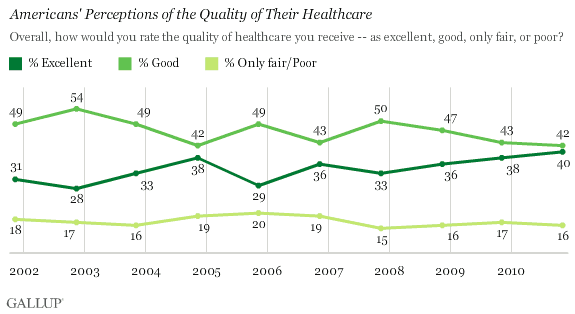
The national debate over healthcare reform in the past two years focused mainly on improving access to health insurance as well as on lowering costs. As Congress considers further changes to U.S. healthcare policy, or possibly scaling back the new law, it is important to bear in mind that the vast majority of Americans, overall, believe they are getting at least good quality healthcare under the current system.
These results are from Gallup's annual Health and Healthcare survey, conducted each November. An analysis of data from 2006 through 2010, encompassing more than 5,000 interviews with U.S. national adults, reveals that those with either private or government health insurance are far more upbeat about the quality of their healthcare than are those with no health insurance. Further, the slight majority of those with no health insurance also say the quality of care they receive is either excellent or good, although a relatively scant 14% call it excellent.
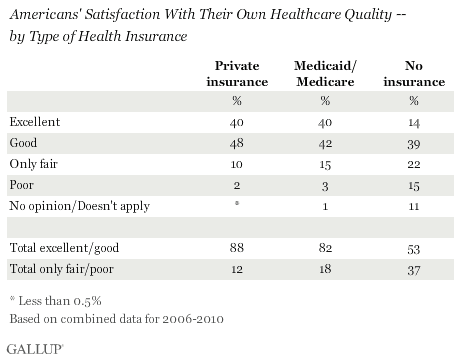
Higher-Income Americans Rate Their Healthcare More Positively
Naturally, perceptions about the quality of one's healthcare are related to household income, because household income is related to access to health insurance. However, even among adults with private health insurance, positive evaluations of one's healthcare increase with income, from 77% among those making less than $30,000 a year to 92% among those making $75,000 or more. A similar income pattern is seen among Medicare/Medicaid recipients, as well as among the uninsured. This may be the result of either upper-income Americans' ability to afford better plans, or their comparatively better health status.
Still, the vast majority of insured Americans, regardless of income, as well as about half of uninsured Americans, give high marks to the quality of care they receive.
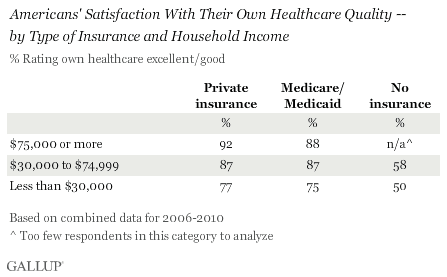
Beyond these factors, Gallup also finds that, regardless of income, older Americans are generally more satisfied with the quality of their healthcare than are younger Americans. This is particularly true among those living in low- and middle-income households.
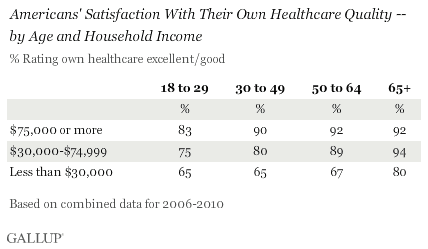
Rate of Delaying Treatment Remains Elevated
Americans' evaluations of their own healthcare are broadly positive, and, in terms of the percentage rating it "excellent," have generally improved since 2001. Over the same period, however, the percentage reporting that they or a family member has put off treatment because of cost increased from 19% in 2001 to 30% in 2006, and has generally remained at that level since. A record-high 21% now say they put off treatment for a serious condition.
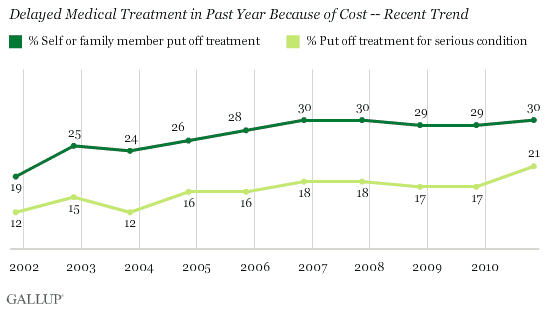
Bottom Line
The U.S. healthcare system has come under scrutiny in recent years because of the high number of Americans who lack health insurance -- a figure Gallup-Healthways puts at 16% -- as well as rising costs. Nevertheless, the majority of Americans, including those without health insurance, appear content with the quality of care they receive, suggesting there is much to be preserved in the current system. Whether that persists if costs continue to rise, thus discouraging even some insured Americans from seeking needed medical attention, remains to be seen.
Survey Methods
Results for this Gallup poll are based on telephone interviews conducted Nov. 4-7, 2010, with a random sample of 1,021 adults, aged 18 and older, living in the continental U.S., selected using random-digit-dial sampling.
For results based on the total sample of national adults, one can say with 95% confidence that the maximum margin of sampling error is ±4 percentage points.
Interviews are conducted with respondents on landline telephones (for respondents with a landline telephone) and cellular phones (for respondents who are cell phone-only). Each sample includes a minimum quota of 150 cell phone-only respondents and 850 landline respondents, with additional minimum quotas among landline respondents for gender within region. Landline respondents are chosen at random within each household on the basis of which member had the most recent birthday.
Samples are weighted by gender, age, race, education, region, and phone lines. Demographic weighting targets are based on the March 2009 Current Population Survey figures for the aged 18 and older non-institutionalized population living in continental U.S. telephone households. All reported margins of sampling error include the computed design effects for weighting and sample design.
In addition to sampling error, question wording and practical difficulties in conducting surveys can introduce error or bias into the findings of public opinion polls.
View methodology, full question results, and trend data.
For more details on Gallup's polling methodology, visit www.gallup.com.
